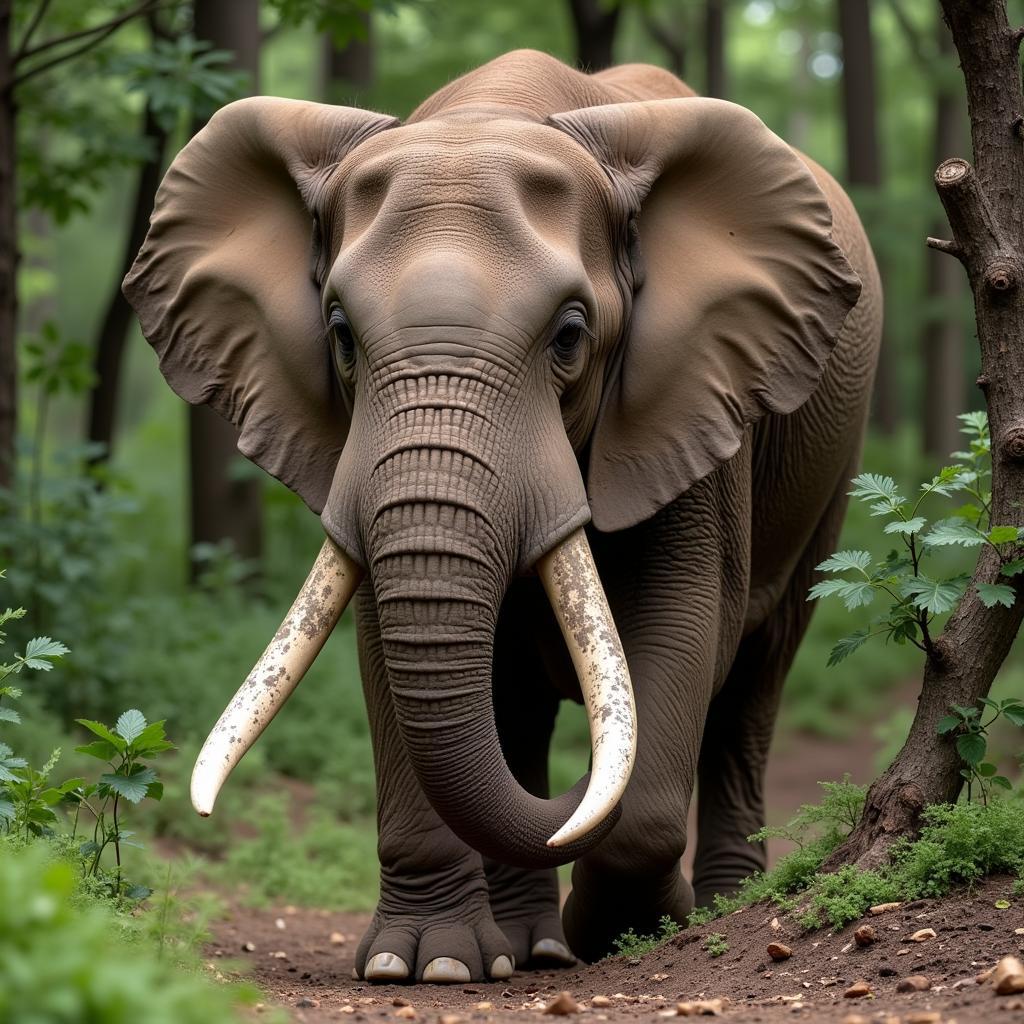African Forest Elephant Adaptations: Thriving in the Jungle Giants
The African forest elephant, a denizen of the Congo Basin’s dense rainforests, boasts a remarkable suite of adaptations that allow it to navigate the challenges of its unique habitat. These adaptations, honed over millennia, are not merely physical; they encompass intricate social structures and behaviors that ensure the survival of this magnificent species.
Navigating the Green Labyrinth: Physical Adaptations of the African Forest Elephant
The dense, often dark, rainforest environment has shaped the physical attributes of the African forest elephant in fascinating ways, setting it apart from its savanna-dwelling cousin. These adaptations are key to its survival:
- Smaller Size, Increased Agility: Unlike the African bush elephant, the forest elephant is noticeably smaller, a characteristic that allows it to move more easily through the dense undergrowth and navigate tight spaces between trees. This agility is crucial for accessing food and evading predators.
- Darker Pigmentation, Optimal Camouflage:
 African Forest Elephant Camouflage The forest elephant’s dark grey skin provides effective camouflage in the dappled light of the rainforest. This is particularly important for calves, who are more vulnerable to predators.
African Forest Elephant Camouflage The forest elephant’s dark grey skin provides effective camouflage in the dappled light of the rainforest. This is particularly important for calves, who are more vulnerable to predators. - Straight Tusks, Forest Tools:
 African Forest Elephant Tusks Unlike the outward-curving tusks of the savanna elephant, the forest elephant’s tusks are straighter and point downwards. This allows them to use their tusks as tools for digging for minerals, stripping bark from trees, and clearing paths.
African Forest Elephant Tusks Unlike the outward-curving tusks of the savanna elephant, the forest elephant’s tusks are straighter and point downwards. This allows them to use their tusks as tools for digging for minerals, stripping bark from trees, and clearing paths. - Sensory Perception: Their sense of hearing and smell are highly developed, enabling them to detect danger and locate food in the dense forest. african forest elephant rainforest
Beyond Size and Strength: Behavioral Adaptations
The challenges of the rainforest extend beyond the physical. African forest elephants have developed complex social structures and behaviors that allow them to thrive in this demanding environment.
- Smaller Herds, Stronger Bonds: Unlike their savanna counterparts, forest elephants live in smaller, more closely-knit herds. This allows for greater efficiency in foraging and navigating the dense forest.
- Long-Distance Communication: The dense vegetation hinders visual contact, leading forest elephants to rely heavily on low-frequency vocalizations, often inaudible to humans, to communicate over long distances.
- Dietary Adaptations: Their diet consists of a wider variety of plants, fruits, and minerals compared to savanna elephants. They play a crucial role in seed dispersal, contributing to the health of the rainforest ecosystem. 10 african animals
Guardians of the Rainforest: The Importance of Conservation
The adaptations of the African forest elephant are a testament to the power of natural selection. However, these gentle giants face an uncertain future due to habitat loss, human-wildlife conflict, and poaching.
Understanding and appreciating their unique adaptations is the first step towards ensuring their survival. Conservation efforts, focused on habitat protection, anti-poaching initiatives, and promoting human-wildlife coexistence, are crucial for safeguarding these magnificent creatures and the vital rainforest ecosystems they call home.
FAQs about African Forest Elephant Adaptations
How do African forest elephants find food in the dense rainforest?
Their exceptional sense of smell helps them locate fruit and other food sources, while their tusks help them dig for minerals and access hard-to-reach vegetation.
Why are African forest elephants important to the rainforest?
They play a crucial role in seed dispersal, which helps maintain the health and diversity of the rainforest ecosystem.
What are the main threats to African forest elephants?
Habitat loss, poaching, and human-wildlife conflict are the most significant threats to their survival. african elephant facts wikipedia
How can I help protect African forest elephants?
Supporting conservation organizations, raising awareness about their plight, and advocating for sustainable practices that benefit both people and wildlife are all ways to make a difference.
Exploring the Wonders of Africa
- Discover the breathtaking african beautiful nature
- Learn about the diverse african animal and plants
Need help planning your African adventure?
Contact us:
- Phone: +255768904061
- Email: kaka.mag@gmail.com
- Address: Mbarali DC Mawindi, Kangaga, Tanzania
Our team is available 24/7 to assist you.


